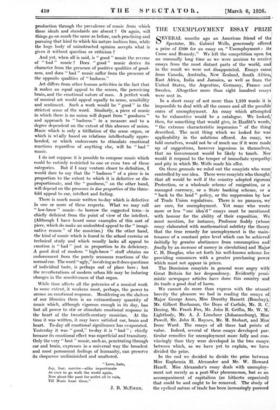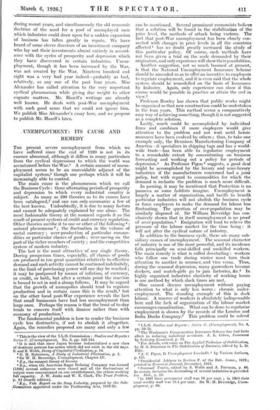THE UNEMPLOYMENT ESSAY PRIZE' S EVERAL months ago an American friend
of the Spectator, Mr. Gabriel Wells, generously offered, a prize of £100 for an essay on. " Unemployment : its' Cause and Remedy." We left the competition open fl an unusually long time as we were anxious to receive, essays from the most distant parts of the world, and in the result we were not disappointed. Essays came4 from Canada, Australia, New Zealand, South Africa, East Africa, India and Jamaica, as well as from the United States, the Argentine, Germany, France and Sweden. Altogether more than eight hundred essays were sent in. In a short essay of not more than 1,250 words it is,j impossible to deal with all the causes and all the possible( cures of unemployment. An essay which attempted! to be exhaustive would be a catalogue. We looked,' then, for something that would give, in Hazlitt's words,! " the extreme characteristic impression " of the thing described. The next thing which we looked for was applicability in the solutions offered. An essay, we told ourselves, would not be of much use if it were made up of suggestions, however ingenious in themselves,! that no Government would be likely to touch. Nor would it respond to the temper of immediate sympathy; and pity in which Mr. Wells made his offer. On these grounds we ruled out the essayists who were' controlled by one idea. There were essayists who thought' that all would be well if the country adopted rigorous Protection, or a wholesale scheme of emigration, or al managed currency, or a State banking scheme, or a' " back to the land " policy, or the suppression by law: of Trade Union regulations. There is no panacea, wel are sure, for unemployment. Yet some who wrote more or less "one idea'd " essays must be mentioned; with honour for the ability of their exposition. We must mention, for instance, Professor Soddy (whose! essay elaborated with mathematical subtlety the theory, that the true remedy for unemployment is the main-1 tenance of a constant price level which can be achieved! initially by genuine abstinence from consumption and finally by an increase of money in circulation) and Major C. H. Douglas, who set forth his well-known scheme for providing consumers with a greater purchasing power which must not appear in prices. The Dominion essayists in general were angry with Great Britain for her despondency. Evidently pessi-; mistic newspaper articles have done this country and its trade a good deal of harm. We cannot do more than express with the utmost brevity the pleasure we had in reading the essays of Major George Ames, Miss Dorothy Bassett (Bombay), Mr. Gilbert Buchanan, the Dean of Carlisle, Mr. B. C. Dening, Mr. Frank Fox, Mr. John R. Griffin, Mr. W. M. Lightbody, Mr. A. J. Limebeer (Johannesburg), Miss Powell, Mr. John R. Raynes, Mr. M. Stobart, and Miss, Irene Ward. The essays of all these had points of value. Indeed, several of these essays developed par- ticular remedies for unemployment more fully and con- vincingly than they were developed in the two essays between which, as we have yet to explain, we have divided the prize. In the end we decided to divide the prize between Miss Euphemia H. Alexander and Mr. W. Howard Hazell. Miss Alexander's essay deals with unemploy- ment not merely as a post-War phenomenon, but as an accompaniment of capitalism (as hitherto organized) that could be and ought to be removed. The study of the cyclical nature of trade has been increasingly pursued during recent years, and-simultaneously the old economic doctrine of the need for a pool of unemployed men which industries could draw upon for a sudden expansion of business has fallen greatly in repute. We have heard of some clever directors of an investment company who lay out their investments almost entirely in accord- ance with the cycles of prosperity arid depression which they have discovered in certain industries. Unem- ployment, though it has been increased by the War, was not created by the War. Nineteen hundred and eight was a very bad year indeed—probably as bad, relatively, as any one of the past four years. Miss Alexander has called attention to the very important cyclical phenomenon while giving due weight to other cognate matters. Mr. Hazell's writings are already. well known. He deals with post-War unemployment with such good sense that we could not ignore him. We publish Miss Alexander's essay here, and we propose to publish Mr. Haze11's later.







































































 Previous page
Previous page